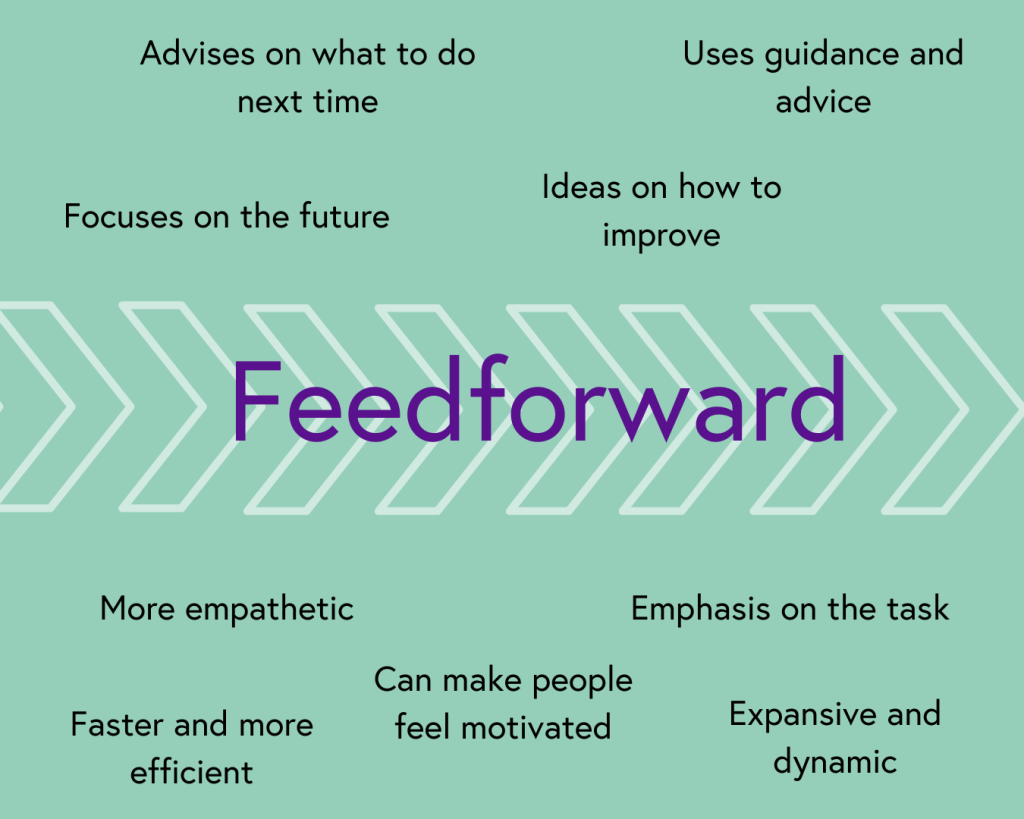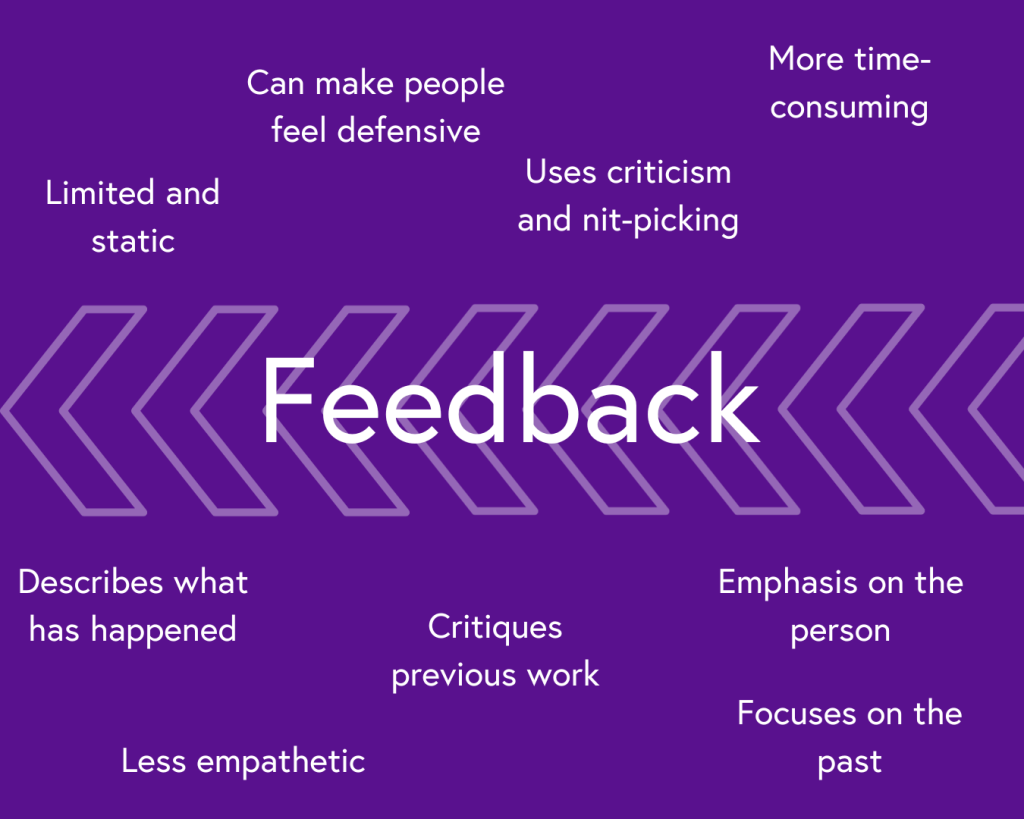Feedback? No, feedforward: are you going to try this new approach?
We’re being advised to replace the term feedback with “feedforward” to prevent any anxiety or stress induced by suggesting we’re going to give one of our team members some feedback.
“Feedforward is about this forward-looking view of people, performance and potential.” Theresa Adams, senior HR knowledge adviser at US human resources trade association SHRM, observes: “Feedback conversations, as they commonly exist today, activate a social-threat response in the brain interfering with the ability to think clearly, and raising heart rates.”
Oh, where do I start with this
Let’s tackle the heart rate issue first: if a doctor suggests that we could add a bit more strenuous exercise into our daily routines to get our heart rates up, it would be a bit of a shocker if someone then told us that a raised heartbeat was bad for us. I am no doctor, but I can categorically say that a raised heartbeat is not something to be concerned with, after all we’re talking about a 5 or 10 minute feedback meeting, not something that lasts a full 24 hours.
Getting comfortable with discomfort
Feeling uncomfortable, i.e. discomfort, (or having a social threat response in the brain triggered) is not necessarily a bad thing. If we only ever operate in ‘comfort’ then we don’t stretch ourselves, develop or grow as we otherwise could. This narrative that discomfort adversely affects our mental wellbeing is, in my view, damaging careers and damaging businesses. We need people regularly stepping out of comfort zones and as a result continually learning and growing.
And the more we experience discomfort, again through my experience and observation, the more resilient we become and as a result, the less often a ‘social threat response’ will be triggered in our brains.
No discomfort, no resilience.
I was recently asked by a delegate on a training course if I was serious about this. She said: “So, feeling uncomfortable is good for me? I’ve been told my whole life it will negatively affect my mental wellbeing”.
After I picked my jaw up off the floor, (seriously a 30+ year old believed that all discomfort is bad?), I replied that if she never experienced a bit of discomfort, a bit of fear or anxiety about trying or doing something new or being stretched a bit, she would never step out of her comfort zone and as a result would never learn and grow and achieve her potential. That meant that her career and earnings would at some point stall, she will probably be unhappy, frustrated and upset about that, but ultimately feel powerless to change it. I asked her – in my softest, most empathetic HR voice “How is all that going to negatively affect your mental health?”
Life is not and cannot be about living in a bubble, never tested, never challenged, never upset, never uncomfortable. We learn the most when things don’t go right, we learn from being challenged, we grow when we do things we thought we couldn’t do, we thrive when we’ve had a few failures and learnt how to bounce back.
The potential of feedforward


Perhaps this comment about anxiety and heart rate is doing the concept of “feedforward” a disservice. Effectively in the quote above, Theresa Adams was giving feedback about “feedback” rather than focussing on the potential of feedforward!
As I understand it, the value of feedforward is that you focus on coaching/development rather than commentary of what has happened, and setting out what needs to change going forwards.
Instead of:
“You made three errors in letters to clients last week that have come to my attention as a result of complaint emails received from those clients, so it’s essential that you focus on attention to detail going forwards. I need error free work as maintaining client satisfaction is critical. Let’s review this in one month’s time”.
You say:
“So we can learn from what happened last week, going forwards, I suggest you build in time to check all your emails and letters before they go out and if in doubt about how to phrase something, please do ask”.
Or instead of:
“In our team session yesterday, you chose to disagree with your colleagues on a few points. I understand that you feel strongly about diversity/work allocation/car parking/pension (etc) issues but the language that you used and your non-verbals (body language) were perceived by me and others in the room to be aggressive and unprofessional. Please ensure that in future situations where you want to disagree with what is being said that you are both professional and considered in the language that you use. Let’s review this in a month’s time”.
You say:
“I am concerned that you found yesterday’s meeting difficult and that things got somewhat heated. Going forwards can I suggest that you take a look in our eLearning library for some guidance on assertive behaviour and my advice to you is that workplace discussions are seldom about win/lose. A more confrontational approach can damage collaboration and relationships. If ever you are unsure how to respond to situations, please do ask”.
Which approach will you be taking?
Two examples and two styles, which do you think is the better way to deliver what your business needs?
It’s not for us at Jaluch to say how you speak with your staff and what approach you choose. Perhaps you’ll find value in combining feedback and feedforward? That’s your commercial decision. If you like the softer approach then you might be interested to know that reviews and feedback sessions are being rebranded by some organisations as ‘connect conversations’ and ‘perspectives’ (Microsoft).
What we would though say, as an HR provider that tends to only get drawn into HR issues when things have gone pear shaped is:
Make sure all your managers are crystal clear when they need to start talking more formally, with clear examples of poor performance or unacceptable behaviour, and setting clear goals for improvement. Delaying too long will give both the employee and rest of the team the impression that poor performance and/or behaviour will be tolerated. That will undermine your authority and damage your professional standards. Managers need to be very careful not to be so soft they are viewed as friends, workplace counsellors, or buddies.
Managers have to be tough and bold enough to manage, set and maintain standards, and say things that make others uncomfortable at times. If we stop them doing that, then we are stopping them from managing.
How Jaluch can help
So, have your managers got the tools for the task? Do they know how to manage performance, how to set objectives, and how to deliver feedback, or feedforward?
Speak to us about HR support or training for your managers and/or first line HR staff.
AUTHOR DETAILS

